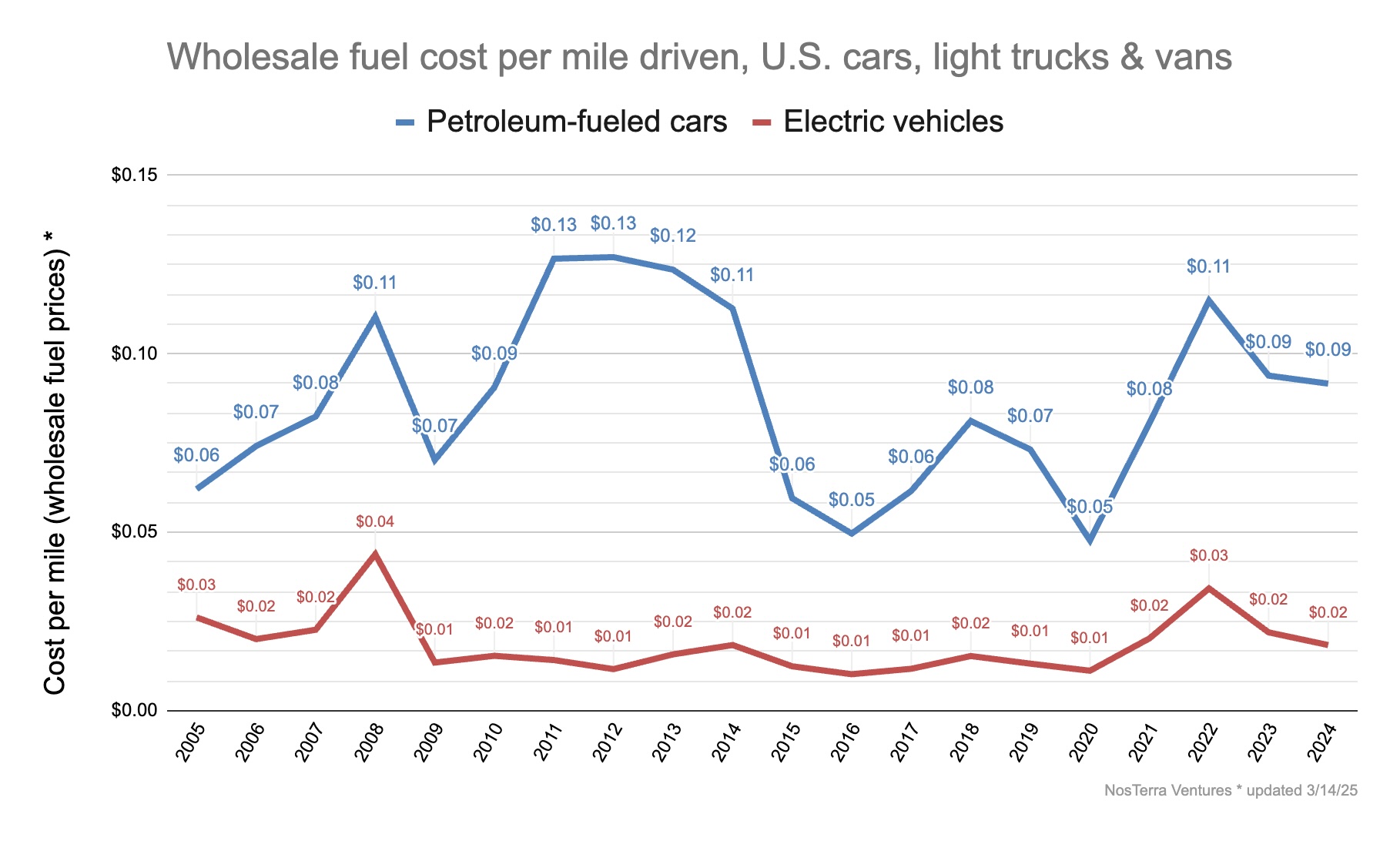Comparing the Wholesale Cost of Fuel for EVs and ICEs

Note: This article has been updated. It was originally published here.
I’m following up on one of my recent posts, in which I argue that driving petroleum-fueled vehicles instead of electric vehicles has cost the U.S. $6 trillion in additional dollars over the past 20 years (links are below in the comments). That cost delta emerges from deriving wholesale fuel costs from two very different markets. One market, for wholesale petroleum, is dominated by cartel pricing that’s controlled by the owners of the raw material.
In contrast, the electricity grid treats energy as a commodity and sells kilowatt hours. All electricity generation needs to compete against all other sources in a market that is constantly searching for the lowest price at any given time of day. The result is a radical reduction in the cost to fuel a car that buys its energy off the grid.
Let’s run through the calculation in detail. I’m going to start by limiting this discussion to wholesale pricing to avoid the various taxes that exist on retail pricing. I am also going to limit it to passenger vehicles and light trucks and vans because that market drives overall pricing, those vehicles have the highest fuel efficiency, and there are readily available electric-powered alternatives.
The average price of crude oil over the past 20 years rounds out to be ~$75/barrel. One barrel of crude produces 20 gallons of gasoline after the refining process.
In 2023, Americans drove 10,565 million miles in their cars and 11,321 million miles in light trucks and vans, according to the U.S. Department of Energy (DOE).
The average fuel efficiency for cars is 24.4 miles per gallon (mpg), and 17.8 mpg for light trucks and vans, according to the DOE. That means passenger cars get an average of 488 miles out of a single barrel of crude, while light trucks & vans get 356 miles out of a barrel.
Factor in the slightly different percentage of miles driven, the different fuel efficiencies, and the fact that gasoline accounts for only roughly 46% of what’s output from refining a barrel of crude oil, and you get an average wholesale cost “at the barrel” of $0.085 per mile driven in an internal combustion engine car, light truck or van.
To do the same calculation for electric vehicles (EVs), let’s start with the cost of wholesale electricity. Like gasoline, it varies by state and region, but the national average over the past 20 years is $50 per megawatt hour, according to data from eia.gov. EVs have an average fuel efficiency of 346 watt hours per mile, according to various sources.
Therefore, it would have cost us only an average of $0.016 per mile to fuel our vehicles if they had all been electric, taken at wholesale pricing levels. That’s less than 2 cents per mile — and a factor of five difference.
If petroleum had to compete on the electricity market, the wholesale price would have to drop to less than $8/barrel.This is not a question of clean energy versus fossil fuels. It’s a matter of the exorbitant price of petroleum as a fuel.
📚 Background reading & relevant links:
• My previous post: https://bit.ly/4bzzfvB
• U.S. Energy Information Administration (EIA) data for the cost of crude oil: https://www.eia.gov/dnav/pet/hist/LeafHandler.ashx?n=PET&s=RBRTE&f=A
• U.S. Department of Energy (DOE) data on average number of miles driven: https://afdc.energy.gov/data/10309
• DOE average fuel efficiency data: https://afdc.energy.gov/data/10308
• EIA wholesale electricity data: https://www.eia.gov/electricity/wholesale/#history
— Dave Welch